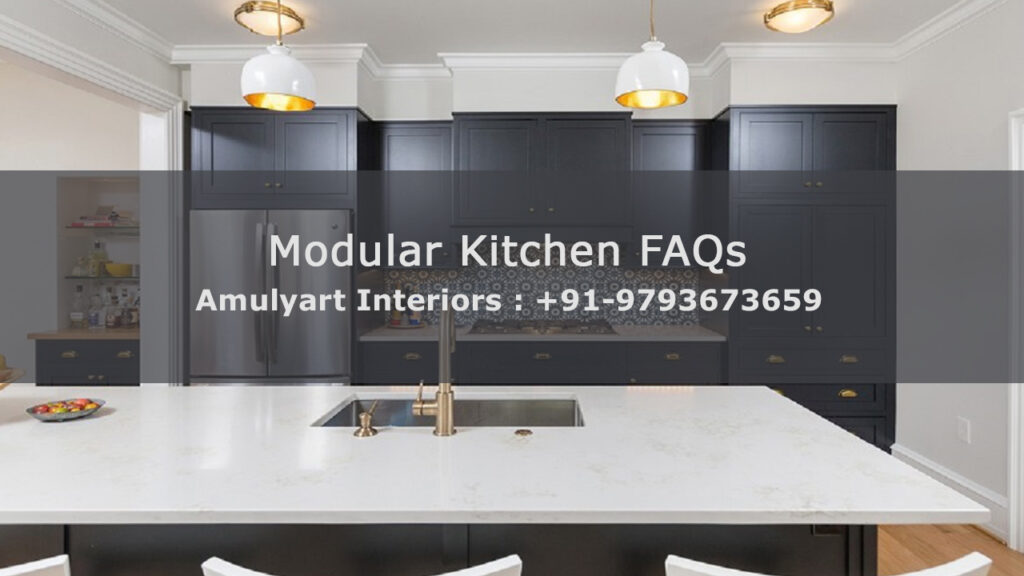Question 1. What are the Benefits Provided by Contemporary Modular Kitchen Design?
- Maximization of Space Utilization: There is a maximization of space utilization in modular kitchens, as every square inch available space has been utilized in its design. You can easily access even tough-to-reach places through well-designed modules and accessories to ensure ample storage space. Using this arrangement, you can easily add additional appliances or features that might be hard to accommodate in standard kitchens.
- Economical: Modular kitchens are often costlier because of increased labor and material needs. In modular kitchens, on the other hand, units are mass-produced in a factory in standard sizes. Thus, production costs are reduced as well as waste. Since pre-assembled modules need only assembly on site, they are cheaper than any built-to-order ones.
- Easy Installation: It is easy to disassemble or assemble modular kitchen units. The process saves time and work through joining pre-fabricated parts.
- Elegant and Practical: The beauty and functionality of these kitchens are expertly blended. Modular kitchen designs are an excellent choice if you want to update your kitchen on a budget.
Question 2. What Kinds of Materials Are Frequently Used in Modular Kitchens?
- Supplies for Cabinetry: Some of the materials used to construct the fundamental framework of modular kitchens are stainless steel, particleboard, MDF, plywood, and high-moisture-resistant boards. Due to their affordability and durability, waterproof plywood and PVC are widely used.
- Finishing Materials : Laminate, acrylic, membrane, PU, glass, and veneer are some of the most common finishes that enhance the appearance of cabinets and shutters.
- Hardware Materials: Wood, glass, crystal, stainless steel, or brass can be used to create visible hardware such as knobs and handles. Use high-quality hardware since invisible components like hinges, locks, and sliding tracks are essential to functionality.
Question 3. What Materials Are Ideal for Countertops in Kitchens?
Kitchen counters can be made of granite, marble, ceramic tiles, laminates, wood, and stainless steel. Products that are heat-resistant, scratch-proof, and waterproof ensure long-term durability. Marble and granite are high-end options, but they are more expensive. Think about your demands and budget before making a decision.
Question 4. What Color Schemes Are Often Used in Modular Kitchens?
To add interest and depth, use several tones of the same color when producing simple designs. White with neutral color will help one feel warmth, as well as creating ample space. Black-colored cabinets made of metallic elements will make one create a rich industrial style. Complementary colors such as gray and terracotta, or muted green and yellow can be combined with the foundation color to produce this vibrant effect.
Question 5. Which Appliances Are Allowed in Modular Kitchens?
As their flexibility is great, modular kitchens allow you to incorporate any type of appliance. You can hide built-in appliances, such as microwaves, ovens, refrigerators, and dishwashers, behind shutters. You can keep countertops tidy by setting aside specific storage areas for small, portable appliances like a toaster or blender.
Question 6. Which are the Essential Accessories Required for Modular Kitchen?
- Cutlery, knives, and condiments are best stored in trays and organizers.
- Baskets: Ideal for holding cleaning materials, tools, and larger objects like pots and pans.
- Pull-outs for bottles: Make good use of small areas.
- Tall Units: In small spaces, either single- or double-panel units maximize vertical storage capacity.
- Corner Units: Give kitchens with L, G, or U shapes useful corners.
Question 7. Are Modular Kitchens Compatible with Pre-Existing Platforms?
Indeed, fixed platforms can integrate modular kitchen parts.. You may opt for a completely modular kitchen to be designed according to your plan for new spaces .Modular cabinets, drawers, or add-ons may be introduced to existing kitchens to enhance functionality .Pull-out drawers and other modular parts may be implemented with ease even if the countertops and framework are already installed.
Question 8. Is Modular Kitchen Guaranteed?
For defects or issues with the units, most manufacturers provide warranties. However, wear and tear would not be included. Always read the manufacturer’s warranty terms before buying.
Question 9. How Do I Maintain My Modular Kitchen?
- Wipe surfaces frequently using a clean, dry cloth to prevent dirt buildup.
- Treat stains immediately by using a fresh towel to wipe off the stain.
- Ensure that hinges, tracks, and other hardware are serviced regularly so that the operation is smooth.
- Don’t overfill cabinets or drawers to avoid damage.
- Use gentle cleaning agents so that the finish and scratches are not damaged.
Question 10. How Much Does a Modular Kitchen Cost on Average?
A modular kitchen’s cost is established by many factors, such as the size, type, and quantity of pieces, along with materials, finishes, and labor costs. A fully modular configuration will cost more than adding a few modules to an existing space. Consult a contractor or service provider for an accurate quote.
These frequently asked questions will help you make an informed choice by covering all the important aspects of modular kitchens, from colors and materials to pricing and upkeep!


